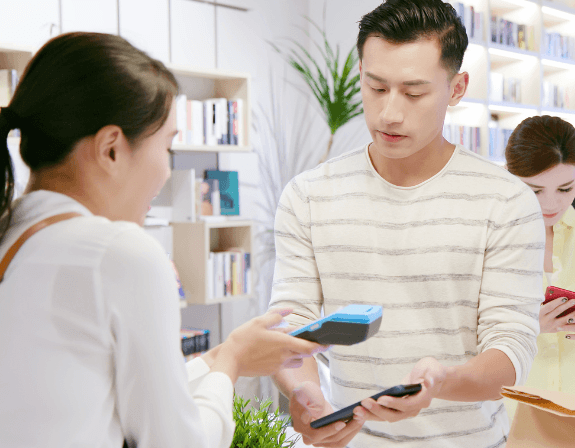How to Improve Mobile Device Sales on the Retail Floor

Selling personal devices like smartphones, tablets and wearables on the retail floor can be incredibly lucrative – if you can convince shoppers to buy. All too often, in-store customers will examine devices, and perhaps talk to your salespeople, but won’t actually purchase a device, instead opting to buy online directly from the manufacturer. What can retailers do to close more sales?
The name of the game for increasing device sales is personalization.
Many customers are quite excited to shop in-store again, after nearly two years of not being able to – at least not without significant concerns and restrictions. However, retailers need to make sure that entering the store is worth the effort and offers more than even the best e-commerce shopping experience can.
This means that store employees, especially those who directly engage with customers to drive sales, need to do more than just be friendly and available – they need to be compelling and persuasive. The best way to do this is to create an in-store execution strategy.
An in-store execution strategy is composed of a few key features:
- Merchandising: Your store stocks what the customer wants. For device sales, this means having the latest releases within days or a few weeks of official availability. Announcing when new highly desired products come into stock on social media and on your website homepage is a great way to get the word out.
- In-store displays: Draw customers to hero SKUs. While many will come in specifically to look at the new devices, even more customers will be visiting your location to buy unrelated items but could be drawn to the device display with the right displays.
- Planograms: Consistent paths. As customers enter the retail location, there should be a logical progression of products they see, as well as displays that inform them as to what is available elsewhere in the store. Planograms are a great way to ensure that merchandise is located where it should be, that those locations make sense to customers as they enter and move about the space, and that multiple retail locations are as consistent as possible.
Staff for stores should be well prepared by HQ as well as their individual locations to offer highly knowledgeable answers to questions about competing devices and do so in a personable way that pushes the customer towards making a decision that day.
It’s important to understand that those who shop in-store will generally all have some desire to hold a few devices in their own hands to see if it feels right to them and are likely to want to compare a few devices. They will have questions about various options, which your salespeople should be well equipped to answer at various levels of technical understanding.
However, they will come in varying demographics – and having a flexible space to accommodate a wide range of ages, technical savviness and physical comfort will be a major boon in sales. This is especially true for customers who are hesitant to make a decision, those who are physically disabled or those who are tech laggards for a variety of reasons. Allowing them a more customized, flexible experience can be the difference that makes the sale.
While expensive devices have traditionally needed to be tethered down for security reasons, in 2022 and beyond, it’s key to allow customers to be able to hold devices in their own hands and show comparisons and compatibility between devices – for example, using a smartphone as a remote for a television.
Sales can also be significantly encouraged if team members are able to bring customers to tables to compare and demo various devices and offer a more personable experience.
This can all be done without compromising security with InVue’s new wireless solutions, namely OnePod Wireless, which offers comprehensive security, or the S3100V, which has the added benefit of built-in customer experience monitoring and metrics.
These types of wireless security solutions also allow customers to really feel how the device works for their hand size, without being excessively bulky. This is especially compelling to a variety of potential buyers, especially those with small hands or difficulty holding objects.
Stock premium accessories.
Finally, a great way to push a customer who has decided what they want but is unsure if they should buy in-store or wait until they can buy online is to stock premium accessories in store. These should include unique cases sized for all of your hero SKU devices as well as other popular trends like attachable grips, wireless charging pads, a wide variety of headphones and earbuds, and other relevant items.
Include a promotion for accessories along with purchase, such as 50% off cases, a credit towards audio devices, or similar, when possible.
Offering customers, a personalized experience – from the time they enter the store until the time they leave – can be the key difference in securing the sale in-store instead of driving shoppers online.